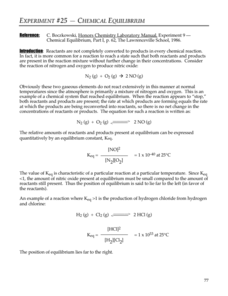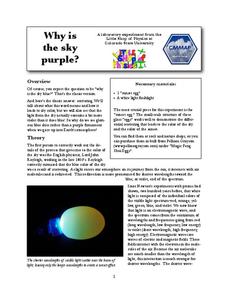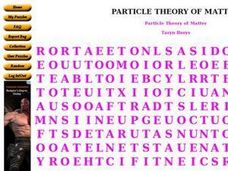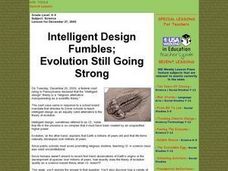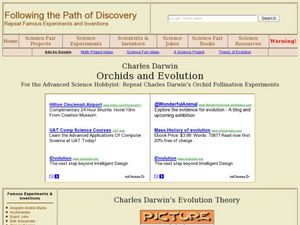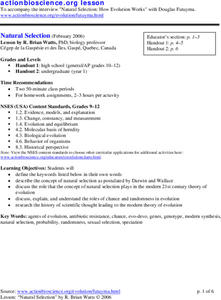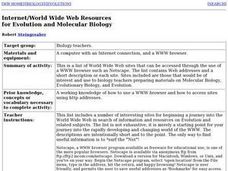NOAA
Plate Tectonics I
Young geologists get a glimpse beneath the earth's surface in this plate tectonics investigation. After first learning about the different layers of the earth and the constant movement of its plates, young...
California Academy of Science
Earthquakes and Tectonic Plates
Here is a comprehensive package in which middle schoolers learn about types of seismic waves, triangulation, and tectonic plate boundaries. Complete vocabulary, colorful maps, and a worksheet are included via links on the webpage. You...
Pingry School
Chemical Equilibrium
We know about the light spectrum, the age spectrum, and sound spectrum, but do chemical reactions also occur on a spectrum? Young scientists experiment with partial reactions on a spectrum and observe the color changes. Then, they...
Clarkson University
Understanding Energy (With a Pendulum)
Have you ever wanted to play with a giant pendulum? An experiment allows small groups to do just that. They gather data and make observations as they complete the included worksheet. The instructional activity lays out each instruction...
Colorado State University
If You Can't Predict the Weather, How Can You Predict the Climate?
Why is the weather man wrong so often? Young climatologists discover how chaos rules both weather and climate through a math-based activity. Using an iterative equation, the class examines how small day-to-day weather events total up to...
Colorado State University
Why Is the Sky Purple?
The color of the sky depends on the time of day. Young scholars experiment with scattering different wavelengths of light to recreate the color of the sky. They observe both the longer blue wavelengths and the shorter red and orange...
Colorado State University
Why Does it Get Colder on a Clear Night than a Cloudy Night?
Clouds are nature's insulator! A lab investigation asks learners to use an infrared thermometer to measure differences in infrared temperatures. They find that pointing the thermometer at a cloud has a much different result than pointing...
Cold Spring Harbor Laboratory
Genes Get Shuffled When Chromosomes Exchange Pieces
Some genes link to others that have implications for inheritance. A set of resources lead pupils through the history of this discovery. They explain how chromosomes recombine and which parts are more susceptible to this linkage....
Curated OER
Particle Theory of Matter
In this science word search worksheet, students identify and locate words in a puzzle that relate to particle theory of matter. There are 24 words to locate in the puzzle and spell correctly.
Curated OER
African Americans in Science
Students examine the life of renowned African American scientists. In this science literacy lesson, students explore a website containing profiles and achievements of past and present African American scientists. They prepare a poster...
Curated OER
What Is Your Explanation for the Evidence?
Students encounter an interactive computer program activity designed as a diagnostic of student beliefs related to the theory of evolution. Students process the Hypercard cascades structured around a set of biological topics related to...
Curated OER
Intelligent Design Fumbles; Evolution Still Going Strong
Students examine how all life is related and how species are classified. They also discover how traits are passed down from one person to the next. They examine the evolution the arthropod has going through.
Curated OER
Matter and Energy
Students participate in a small group read aloud of the short story, "Cerium" by Primo Levi. They answer several questions about the story and then relate the reading to a lecture on Kinetic theory. After the lecture they apply the...
Curated OER
Orchids and Evolution
Young scholars study Charles Darwin's evolutionary theory and how he applied it to orchids. In this evolution lesson students repeat Darwin's orchid pollination experiment.
Curated OER
Introduction To Natural Selection
Seventh graders investigate the concept of natural selection and it relation to the theory of evolution. They create a definition for classification based upon looking at other subjects that are similar. The variation of species is...
Curated OER
Natural Selection
Students use discussion questions, handout information and research topics to explore several issues related to natural selection and evolution. They examine Darwin's research on the finch and antibiotic resistance.
Curated OER
Island Biogeography and Evolution
Students develop likely phylogenies for seven related populations of lizards living on the Canary Islands using real data. They organize charts, and record the data for geography, geology, morphology, and molecular genetics.
Curated OER
The Origins of Man
Students learn about new technologies being used to update what is known about human evolution and migration. They then compare the new theories to the traditional knowledge.
Curated OER
Understanding Cells
Students identify and define several related vocabulary terms. Students complete a short lab and complete the questions. Students create a cell crossword puzzle and play cell computer games through the included links.
Curated OER
Birds of a Feather Flock to the Web
Students define the term "evolution" and relate it to species adaptation, supporting their ideas with examples. They locate, correctly cite, and briefly review two Web sites with information on finches commonly found in their state or count
Curated OER
Internet/World Wide Web Resources for Evolution and Molecular Biology
Students utilize the Internet and all its web access in this lesson. They research all they can on Evolution and related subjects. The journey they begin on leads them into an exhaustible point of possibilities for Evolution and all its...
Curated OER
Anthropology and Sociology
Students examine the combined subjects of anthropology and sociology and explain how the disciplines would study the same issue. On poster board, they locate or draw pictures related to the two subjects. Once this is completed, students...
Curated OER
Time Conceptualization
Students relate the number and length of generations in their living family members to the number of generations that have passed since specific events in recorded history. They then apply this time conceptualization to the number of...
Curated OER
Review for Chemistry
In this review for chemistry worksheet, students decide if given statements are true or false. Students relate information learned about introductory knowledge gained in chemistry to accurately answer the given questions.




